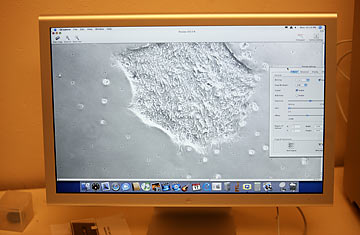
A colony of human embryonic stem cells is seen on a computer monitor at the University of Wisconsin–Madison
(2 of 2)
The largest concern among stem-cell experts involved the status of the few dozen stem-cell lines that had qualified for federal funding, even under Bush's more restrictive policy. Stem-cell lines derived from those embryos are currently seeding many different studies, but because the embryos were not donated under the same stringent informed-consent procedures that will be required starting Tuesday, it's possible they may no longer be eligible for federal financing.
The NIH is asking scientists working with these lines to submit as much documentation as possible to demonstrate that the embryos were donated voluntarily, without coercion and without any monetary benefit to the donors. This material will be reviewed by a select group of scientists, ethicists and community members that will be convened over the next few months as part of a working group of the advisory committee to the director of the NIH.
"They will be exercising judgment, and considering whether the principles of voluntary informed consent were followed, even if the step-by-step procedures currently required were not followed in the derivation of that stem-cell line," said Kington.
It's not yet clear exactly what criteria the working group will use to determine eligibility. But it's possible that stem-cell lines could be excluded from federal funding if, for example, the embryo donors had not been made aware that their embryos would be used for stem-cell research, or if they had given consent for their embryos to be studied only for a specific period of time. If those embryos had been used to generate stem cells, which can theoretically survive indefinitely in a lab dish, the donors may not have technically approved that research.
"We will have to look at what's out there, and determine whether we believe it meets our standards," said Kington.
Kington said that the NIH would continue to review its guidelines for funding eligibility — in particular, regarding cell lines derived from embryos created outside the IVF process. "We know there is strong sentiment in this country for supporting federal funding of research involving cell lines from embryos created for reproductive purposes that otherwise would be destroyed," said Kington. "We don't believe there has been public discussion yet of the ethical guidelines regarding alternative sources of embryonic stem cells. We will reconsider the guidelines as science evolves, and as the public discussion over the ethical principles evolves."
If the speed with which stem-cell advances in recent years have been made is any indication, those revisions may be on the horizon very soon. "These NIH guidelines represent a reasonable compromise, based on where the science stands today," says Dr. Sean Morrison, director of the Center for Stem Cell Biology at the University of Michigan. "But this field is evolving at an incredibly rapid pace, and it may be necessary, down the road, to revisit some of the elements on this policy as the science evolves."
